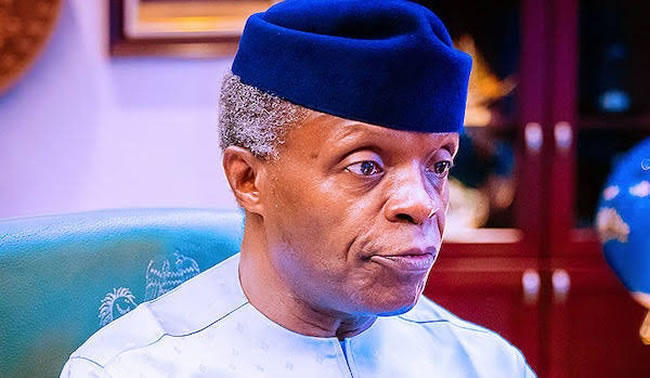
By Chijioke Okoronkwo
Vice President Yemi Osinbajo has called on great and emerging powers, to put aside rivalries and work together with ECOWAS and AU to stamp out terrorism in Africa.
Osinbajo’s spokesman, Laolu Akande, in a statement on Tuesday in Abuja, said the vice president delivered a public lecture at the King’s College, London, UK.
The title of the lecture was, “Africa Can Prosper in an Increasingly Complex World”.
According to the vice president, there is restiveness in the continent which is driven in part by poverty, alienation, environmental degradation and poor governance.
“The more pressing problem today is the encroachment by franchises of global terror groups into Africa; although many African countries have acted vigorously to tackle these terrorist groups.
“There is still much more that can be done especially in partnership with the rest of the international community.
“The Sahel appears to be the worst hit; according to the 2022 Global Terrorism Index, the Sahel has become home to ‘the world’s fastest growing and most deadly terrorist groups’ and Sub Saharan Africa accounts for 48 per cent of global terrorism deaths.
“The Sahel is also said to account for half a million internally displaced persons, 1.8 million people facing food insecurity and 5.1 million people needing humanitarian assistance.
“Given the scale of the problem and the fact that the threat of terrorism anywhere on earth is a threat to the whole of humanity, I think it is time for the global community to treat the menace of terrorism in the Sahel as a common challenge.
“This is one area in which the great powers and emerging powers can put aside rivalries and work together with ECOWAS and the African Union on an initiative to stamp out terrorism in Africa especially in the Sahel.”
Osinbajo said that Africa had been and remained a force for global good.
He made reference to the agreement in 1963 when African countries barely out from colonial rule agreed to respect colonially inherited boundaries.
The vice president said the agreement was a big deal as most wars in the world in previous centuries were often linked to disagreements about boundaries.
“ Following from the respect for colonially inherited boundaries, Africa has also shown outstandingly good example in using its regional integration arrangements to promote peace and security on one hand and trade and industry on the other.
“African regional organisations have taken responsibility for maintenance of peace and security in the continent and its sub-regions.
“Notable in this regard is the strong resistance to unconstitutional changes of government at the African Union and also in regional economic groupings.
“ECOWAS for instance has sanctioned countries like Burkina Faso, Guinea and Mali where soldiers have seized power by coups d’etat.
“Such sanctions include suspension of memberships, travel bans and freezes on financial credits amongst other things.”
Osinbajo commended the AU which has backed up ECOWAS actions and has also suspended the membership of these countries.
He also acknowledged that the U.S. Government issued a statement of specific support for ECOWAS sanctions in Guinea.
Osinbajo praised efforts towards economic development in the continent as Africa had shown outstandingly good example through the establishment of the African Continental Free Trade Area(AfCFTA).
He expressed optimism that AfCFTA would overcome the constraints of Africa’s small, fragmented markets and its impact on commerce within the continent both in goods and services will be profound.
According to the vice president, another investment which has the capacity to act as a game-changer for Africa in the current complex world is digitalisation.
“I think there is a strong conviction that digitalisation offers the best opportunity of leap-frogging for Africa.
“Digital technologies are being deployed across Africa to provide solutions in agriculture, education, Fintech and healthcare delivery.
“ It is also being deployed in logistics and transport and have the potential to be used for smart housing solutions and smart power grids.
“The story of mobile telephony which has provided the platform for the use of digital technologies in daily lives in Africa is one such example.
“ Due to mobile telephony, Africa is ahead of other parts of the world in terms of Fintech and payments solutions; Africa accounts for about half of the world’s mobile money accounts,’’ he said.
He said that more African countries were using AI-enabled surveillance technologies for facial recognition to monitor and respond to crime.
The vice president’s lecture also touched on climate change crisis, the Russian-Ukrainian war, among other issues.
Earlier, Prof. Rachel Mills, the Senior Vice President (Academics) at the King’s College, said the college and especially the African Leadership Centre (ALC) had long standing collaboration with African institutions.
She said that the college, had over the years, demonstrated its commitment to offering quality education to young talented Africans through its partnership programmes with some African Universities.
Mills underscored the importance of the public lecture delivered by the vice president as an opportunity to reflect on Nigeria as a regional leader in economic, political and social terms.(NAN)



